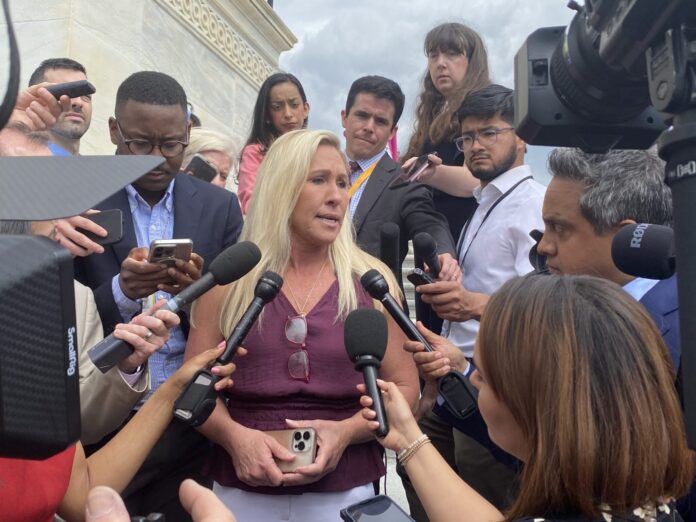
WASHINGTON (States Newsroom) — U.S. House Democrats on Thursday began coalescing behind Republican Speaker Mike Johnson’s plan to provide assistance for Ukraine, Israel and Taiwan through a series of three bills, though far-right members of his own party grew increasingly frustrated with the Louisianan’s bipartisan streak.
Republican Rep. Marjorie Taylor Greene of Rome, Georgia, who is leading an effort to remove Johnson as speaker, told reporters that Johnson is maneuvering behind the scenes to possibly change the process that allows one member to call for a vote to remove the speaker. That is “unprecedented” and “completely wrong,” she said.
“If he wants to change the motion to vacate, he needs to come before the Republican Conference that elected him and tell us of his intentions,” Greene said.
“And I’ll tell you something, Kevin McCarthy, while he was staring down the barrel of a loaded gun, he never made a move like this behind closed doors and made deals with Democrats to change the motion to vacate,” Greene said, referring to the former House speaker who was ousted by Republicans last year. “And we’re hearing that’s exactly what Mike Johnson is doing.”
The motion to vacate currently allows any one member of the House to call for a floor vote to remove the speaker from the leadership post.
Greene said Thursday morning that Johnson is considering altering that motion to vacate process to make it more difficult to accomplish. That could cut off Greene and other far-right members from removing him for advancing foreign aid long sought by Democrats and backed by the U.S. Senate.
Johnson announced late Thursday afternoon that he wouldn’t be taking that step right now, though that’s unlikely to assuage concerns about his leadership style from far-right members.
“Since the beginning of the 118th Congress, the House rule allowing a Motion to Vacate from a single member has harmed this office and our House majority,” Johnson wrote in a social media post.
“Recently, many members have encouraged me to endorse a new rule to raise this threshold. While I understand the importance of that idea, any rule change requires a majority of the full House, which we do not have,” Johnson added. “We will continue to govern under the existing rules.”
Johnson said during a press conference on Wednesday evening that he wouldn’t allow speculation about a motion to vacate to dictate how he runs the House.
“My philosophy is you do the right thing and you let the chips fall where they may,” Johnson said. “If I operated out of fear over a motion to vacate, I would never be able to do my job.”
Johnson said providing “lethal aid” to Ukraine is the right thing to do at this point in history and that it could help deter Russia from attacking a NATO country, which could pull U.S. troops into direct conflict with that country.
“To put it bluntly, I would rather send bullets to Ukraine than American boys,” Johnson said. “My son is going to begin at the Naval Academy this fall. This is a live-fire exercise for me, as it is for so many American families. This is not a game. It’s not a joke. We can’t play politics with this.”
McCarthy removal
Florida Republican Rep. Matt Gaetz used the motion to vacate last October to remove McCarthy from the role following a floor vote. That caused weeks of internal turmoil and public embarrassment for House Republicans as they struggled to coalesce around a candidate who could win the support needed on the floor.
Virginia Republican Rep. Bob Good, chairman of the far-right Freedom Caucus, said Thursday that lawmakers frustrated with Johnson should wait until after the November elections before debating leadership changes.
“I think the speaker guarantees himself that there will be a contest for the speaker, I hope in November,” Good said. “I think that’s the wise course when you’re sitting at a 216-to-213 margin. But, obviously, I can’t predict what the other members will or won’t do.”
Johnson should have used “leverage points” like the annual defense authorization bill, the annual government funding bills and Ukraine aid to force the Democratic- controlled Senate to take up a stalled House GOP border security bill, he said.
Good also reiterated he is not backing the motion to vacate that Greene filed in March and Kentucky Rep. Thomas Massie decided to support this week after calling on Johnson to resign.
The increased attention on the motion to vacate comes as Johnson looks toward a Saturday vote on $95 billion in assistance for Ukraine, Israel and Taiwan that would be approved in three separate bills.
The House is expected to vote on a separate bill wrapping together a ban on the social media app TikTok unless it’s sold by Chinese owner ByteDance and sanctions against Iran, Russia and China.
If all four of those bills pass the House, they’re likely to be wrapped together in one package before being sent to the Senate.
The House might take a separate vote on a border security measure that reinstates Trump-era immigration policies, though that didn’t appear to have the votes needed to move to the U.S. Senate.
Democrats warm to GOP leadership
Numerous Democrats indicated in interviews Thursday that they’re willing to help House GOP leaders move past the procedural hurdle of approving a rule in order to move onto final votes on the emergency aid.
Maryland Democratic Rep. Jamie Raskin said it’s “paramount” that Congress pass assistance for Ukraine after months of inaction and “dislodge all of the dysfunction over on the GOP side.”
“We want to be able to get aid to our allies as quickly as possible and we want to try to stabilize a very chaotic and dysfunctional political environment that has been unleashed on us,” Raskin said.
Florida Democratic Rep. Debbie Wasserman Schultz said she’s reached a point where she’s fine breaking up aid for Ukraine, Israel and Taiwan into three bills if that’s what it takes to get the legislation through the divided Congress.
“We have to all have the courage to take risks, to spend political capital and to make sure that we can literally save democracy and thousands of people from walking to their doom,” she said.
The U.S. Senate approved one bill that included all the aid in February on a 70-29 vote, but that has been stuck in the House ever since as Johnson sought a path forward that was acceptable for most of his conference.
Rep. Steny Hoyer, a Maryland Democrat and former House majority leader, said he expects his party to back the rule and the bills, providing broadly bipartisan votes.
“We want this to pass,” Hoyer said. “We think it needs to pass and we think it needs to pass now. And I believe you will see the support of efforts that accomplish that.”
Democrats would also likely back changing the single-member motion to vacate since it’s “destabilizing demonstrably to the House of Representatives,” Hoyer said.
Hoyer said such a change to House rules should be taken up on its own, but he said Democrats might not object to it being approved within a rule, should House GOP leaders take that path.
“You know, one of the things about democracy is you elect a leader and that leader has a term, in this case two years,” Hoyer said. “And to constantly be subjecting a leader to second guessing every day … is bad for the House, bad for the American people.”
Pennsylvania Democratic Rep. Brendan Boyle said Johnson deserves credit for the comments made during a Wednesday press conference about doing what’s best and not thinking about how it might affect his role as speaker.
“From 1945 until Donald Trump took over the Republican Party, it has always been the bipartisan consensus foreign policy of the United States that we stand up against Soviet and now Russian aggression, that we lead the Trans-Atlantic alliance, that we are the biggest supporters of NATO and the leaders of NATO,” Boyle said.
After Trump won the 2016 presidential election, Boyle said the former president “suddenly changed the base of that party almost overnight from that position to one that is much more isolationist.”






